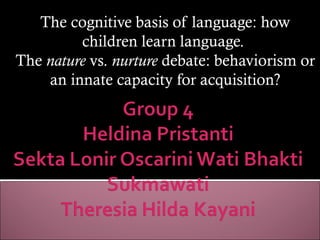
nature VS nurture
- 1. The cognitive basis of language: how children learn language. The nature vs. nurture debate: behaviorism or an innate capacity for acquisition?
- 2. How do children develop? What is Language? How do children acquire Language?
- 4. 3 domains occurs in development
- 5. Language is code that we learn to use in order to communicate ideas and express our wants and needs. Reading, writing, speaking, and some gesture system are all forms of language Language is the systematic and conventional use of sounds (or signs or written symbols) for the purpose of communication or self- expression
- 6. Speech is the spoken form of language
- 7. Children learn language and speech by listening to the language around them and practicing what they hear. In this way, they figure out the rules of the language code. It is not learned all at once but in stages over time.
- 8. Harvey Daniels in “Nine Ideas About Language” says: “ Children learn their native language swiftly, efficiently, and largely without instruction
- 9. There are numerous theories about language acquisition, and they include 2 main schools of thought These theorists propose that These theorists propose we are pre-wired for that language is an language learning. It is part entirely learned behavior of our human “nature
- 10. WHAT DO YOU THINK? INNATE LEARNED NATIVIST EMPIRICIST
- 11. Knowledge originates in human nature Plato and Kant Chomsky Language is innate, and that our brains contain a dedicated special purpose learning device that has evolved for language alone
- 12. Language Acquisition Device (LAD) Receive primary linguistic input in the form of sentences of the language heard by the child, and produces, as output, grammatical sentences of the language Children are not predisposed to learn any particular language; all are born with the same facility and will develop as native speakers of the language of the community into which they are born. The child has innate knowledge of universal principles that govern the structure of language
- 13. UNIVERSAL GRAMMAR Language is essentially the same experience for all human beings, no matter what language they speak, where they are or how they interact with their model Some forms of languages is common to almost all human beings. Language is an ability human process, not by virtue of specific learning or teaching, but by virtue of their humaness
- 14. Behaviorism & associationism Knowledge originates in the environment, and comes in through the senses Children are ‘conditioned” to learn language by a stimulus-response pattern Aristotle Skinner There are no limits to what a human being can become, given time, opportunity and the application of very general laws of learning
- 15. Constructivist & Emergentist Recognizes that many factors influence language development Outcomes can arise for reasons that are not obvious or predictable from any of the individual inputs to the problem
- 16. There are three well known theories: 1. Development cognitive theory (Jean Piaget) 2. Information processing model 3. Social interaction (Lev Vgotsky)
- 17. Children construct their own knowledge in response to their experiences Children learn many things on their own without the intervention of older children or adults Children are intrinsically motivated to learn and do not need rewards from adults to motivate learning
- 18. Four major development stages in children that describe how a child learns
- 19. How the brain processes information and draws comparisons between the brain and a computer
- 20. Social interaction plays an important role in the learning process Zone of Proximal Development describes the differences between what a child will do on his/her own or with guidance
